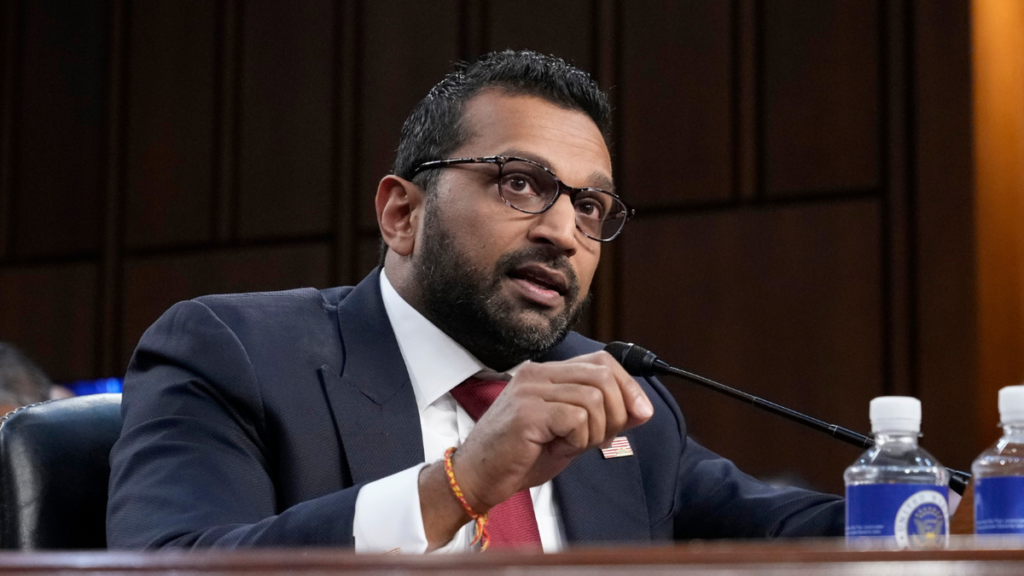
The Senate has confirmed Kash Patel as the new FBI director—a decision that is already making headlines across the nation. This historic appointment comes at a critical time for American law enforcement, as the FBI looks to modernize its operations and strengthen public trust. Patel’s extensive experience in government reform and accountability has sparked excitement among supporters, while his appointment is also prompting important discussions about the future of the agency.
A New Chapter for the FBI
Kash Patel’s confirmation marks a turning point for the FBI. With a career that spans several key roles in public service, Patel has built a reputation for driving change from within. His approach emphasizes transparency, efficiency, and modern technology—all qualities that many believe will help the FBI adapt to new challenges in an ever-changing security landscape.

Patel’s journey to this role was far from typical. He started his career in financial management and quickly moved into positions that allowed him to influence policy and drive internal reforms. His work in streamlining government operations and increasing accountability has been widely recognized, and it is this record of achievement that has positioned him as a leading candidate to helm the bureau.
Background and Career Highlights

Before his confirmation, Kash Patel had already made a significant impact in various government roles. Early in his career, he was known for his ability to cut through bureaucracy and implement practical solutions. One of the most notable moments was his involvement in a high-profile investigation that led to major reforms across several federal agencies. This period of his career not only showcased his skills as a reformer but also cemented his reputation as a leader who could bring about meaningful change.
For many in the law enforcement community, Patel’s appointment is seen as a breath of fresh air. His proactive style and commitment to accountability are expected to revitalize an institution that has faced its share of criticism over the years. With Kash Patel at the helm, the FBI is poised to move forward with a renewed focus on both modernizing its practices and rebuilding its image among the American public.
Key Reforms and Expectations
Under Patel’s leadership, several key changes are on the horizon:
- Modernizing Investigative Techniques: One of the top priorities for Kash Patel is to integrate advanced technology into the FBI’s investigative processes. This means adopting state-of-the-art data analytics, digital forensics, and other innovative tools to improve case resolution and prevent crime more efficiently.
- Enhancing Transparency: Patel has repeatedly stressed the importance of openness in government. His plans include measures to make the agency’s operations more transparent and accountable, which is expected to restore public confidence in the FBI.
- Strengthening National Security: As threats evolve, so too must the methods used to counter them. Under Patel’s guidance, the FBI is expected to bolster its national security efforts by improving collaboration with other agencies and adapting to new forms of crime, including cyber threats and domestic terrorism.
These reforms are not just theoretical. Experts believe that by focusing on technology and accountability, Patel can help the FBI tackle the challenges of the 21st century while remaining true to the agency’s storied legacy.
Historical Context and Interesting Facts

The FBI was established in 1908 and has long been a cornerstone of American law enforcement. Over the decades, it has played a crucial role in major criminal investigations and national security efforts. During previous reform periods, the agency saw improvements in case resolution and operational efficiency. For example, past initiatives to modernize the bureau led to significant advances in digital forensics—a field that is now more critical than ever.
An interesting historical note is that previous reforms within the FBI resulted in a measurable increase in solved cases and public trust. With Kash Patel’s appointment, many are hopeful that a similar wave of positive change will sweep through the organization. His focus on both innovation and accountability could very well usher in a new era for the FBI.
Expert Opinions and Reactions
Across the political spectrum, experts have offered varied opinions on Patel’s confirmation. Many law enforcement professionals and policy analysts commend his deep understanding of governmental operations and his commitment to reform. One leading analyst noted, “Kash Patel brings a unique blend of technical expertise and practical experience. His leadership could be the catalyst the FBI needs to navigate today’s complex security challenges.”
Critics, however, caution that changing an institution as large and entrenched as the FBI will not be without its hurdles. They point out that while Patel’s vision is commendable, the real test will be in the execution of these reforms. Effective change will require not only strong leadership but also the cooperation of an agency steeped in tradition.
Conclusion
The Senate’s confirmation of Kash Patel as FBI director is a landmark moment for American law enforcement. His track record as a reformer and his forward-thinking approach signal a promising future for the FBI. As the bureau prepares to implement new technologies and policies, all eyes will be on Patel to see if he can meet the high expectations set by his supporters.
For the American public, this appointment is more than just a change in leadership—it represents a renewed commitment to transparency, efficiency, and the relentless pursuit of justice. As the FBI embarks on this new chapter, Patel’s leadership will be closely watched by both supporters and skeptics alike.
Kash Patel’s confirmation represents a turning point in the evolution of the FBI. With his blend of experience and visionary leadership, the agency is set to embark on a path of transformative change that could redefine its role in safeguarding America.
FAQs
Q1: Who is Kash Patel?
A: Kash Patel is a seasoned public servant known for his work in government reform and accountability. He has been confirmed as the new FBI director.
Q2: What changes are expected under his leadership?
A: Under his leadership, the FBI is expected to modernize its investigative techniques, enhance transparency, and strengthen national security through improved technology and better inter-agency cooperation.
Q3: What is Kash Patel’s background?
A: Patel has held various roles in government, particularly in financial management and administrative reform. His efforts in streamlining operations have earned him a reputation for effectiveness and innovation.
Q4: How might his appointment affect the FBI?
A: Experts believe his appointment will lead to significant reforms that could modernize the FBI, making it more efficient, transparent, and better equipped to handle contemporary security challenges.
Q5: Why is this confirmation important for the USA?
A: This confirmation is important because it signals a potential shift toward a more open and technologically advanced FBI, which is crucial for maintaining public trust and effectively addressing modern threats.
